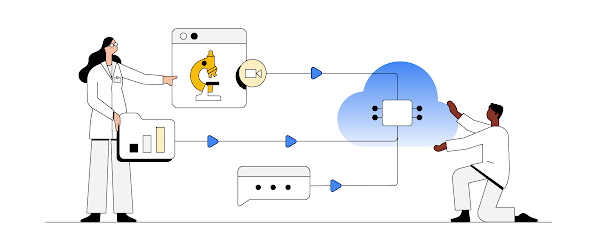The COVID-19 pandemic has impacted all industries over the last year-and-a-half, and research institutions were no exception. In fact, making advancements in medicine and science became an even more urgent priority. Many private sector and government agencies around the globe turned to the cloud to help their remote employee base stay connected and collaborate with cloud tools like chat, video, large file sharing, live document editing, and more. But some scientific research still requires face-to-face collaboration in a lab environment.
This is why we wanted to dig deeper to understand how COVID may have impacted the progress researchers have been making in various critical fields, including medical research, geophysics, climate science, chemistry, computer engineering and more. We commissioned the Harris Poll to explore how the pandemic may have impacted academic researchers around the world. The study surveyed 1,591 respondents across the United States, Canada, Mexico, Argentina, Colombia, Brazil, France, Spain, Germany, United Kingdom, Singapore and Australia. All were employed in either a private or government lab, medical center, or PhD-level program.
Here are the four main takeaways:
Researchers across all 12 countries and age groups are struggling to manage their workloads without face-to-face interaction.The COVID-19 pandemic has taken a toll on productivity, especially in terms of innovation and collaboration. Globally, 67% of researchers reported making less progress in 2020 due to the pandemic. Eighty-five percent of respondents said they struggled to innovate effectively, and 77% said they struggled to test, compute, and collaborate effectively while working remotely. This was true across all types of institutions surveyed.
The pandemic accelerated the demand for collaboration and communication tools–both cloud-based and virtual–for the majority of researchers.An overwhelming majority of researchers (98%) said the pandemic accelerated their need for cloud-based tools. More specifically, they cited the “lack of collaboration tools to replace face-to-face meetings” as one of their biggest challenges. Due to this demand, and despite the lack of tools, the use of virtual collaboration and communication tools increased significantly. Respondents indicated that virtual meetings increased 91% and chat use increased 62% globally.
Usage of all disruptive technologies, including artificial intelligence (AI) and machine learning (ML), increased substantially during the pandemic. The vast majority of those surveyed (96%) reported increased usage of at least one of the following tools: cloud, data and analytics, digital productivity tools, or AI / ML. Of those, the cloud saw the largest increase in usage during the pandemic.
Globally, more than half of researchers surveyed anticipate an increased investment in cloud solutions due to the COVID-19 crisis. Sixty-one percent of researchers reported that their institutions were “not very” or “not at all” prepared for COVID conditions, though those already using the cloud were best prepared. More than 93% of researchers across all work environments agree that COVID-19 has deepened the current and future needs for cloud computing in their organizations. Just over half (52%) of respondents believe their organizations will increase their investment in cloud technologies in the next 12 months.
Survey data also reveal some differences among institutions and regions. For example, researchers employed by private laboratories were more likely than those in other types of research facilities to report an increased use of cloud. Regionally, organizations in Colombia, the U.S., and Australia were the most likely to increase their investment in cloud solutions. Overall, the survey revealed the dramatic impact of the pandemic on research and researchers everywhere, though it also documents how cloud-based tools and strategies helped organizations adapt.
With new SARS-CoV-2 variants making in-person work more difficult, there are number of actions research facilities–private or government-funded–can take in order to continue their important research:
Scale as needed. Cloud technologies can help research institutions implement a support-at-scale model under rapidly changing conditions. Flexible cloud infrastructures make data more accessible and secure so researchers can work together from anywhere, at any scale.
Leverage AI / ML. As the use of AI / ML tools for scientific research increases, research centers need to ensure the quality, safety, and efficiency of their workloads. Cloud provides a platform to quickly build and deliver modern applications and other connected experiences for clinical trials, research studies, patient care, and more.
Optimize data.As academic research centers expand and incorporate new sources of data across multiple clouds, the task of consolidating this data and information becomes a challenge. Cloud technologies enable researchers to break down data silos to gain insight across all teams and ensure a consistent data experience on a fully managed infrastructure.
Maximize ROI.Securing funding is not easy. In fact, 44% of respondents said funding decreased or was redirected during the pandemic. By processing documents and data quickly and securely, cloud-enabled automation tools help institutions increase the speed of decision-making, reduce costs of data entry, and accelerate discoveries.
To learn more about these findings and more, download our infographic. To ramp up your own research project with Google Cloud, apply now for free credits in select countries.
Research methodology: The survey was conducted online and by phone by the Harris Poll on behalf of Google Cloud, from April 22, 2021 to May 17, 2021, among 1,591 researchers in academic laboratories/medical centers, government laboratories, private sector laboratories, colleges/universities, or hospitals/health care systems. Researchers were based in the United States (n=501), Canada (n=100), Mexico (n=100), Colombia (n=100), Argentina (n=100), Brazil (n=77), France (n=105), Spain (n=100), Germany (n=102), UK (n=100), Singapore (n=100), Australia (n=105), and have to have been employed in lab or hospital/medical center or be a PhD student at least one year into program, and work as a researcher or be a decision maker for research facilities.
Cloud BlogRead More


